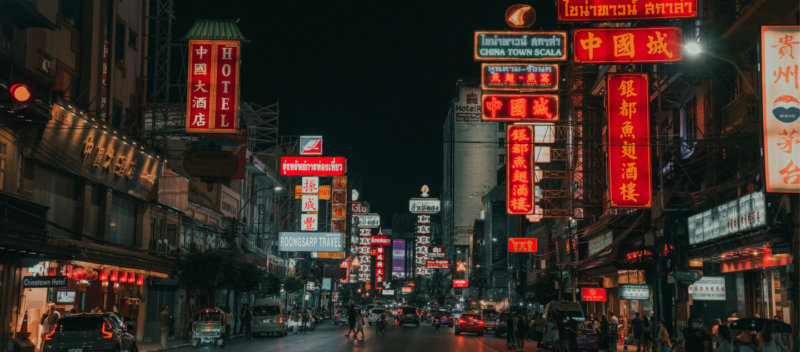

It’s the end of September, which means Bangkok eateries and food stands are covered with little yellow flags as lots of people give up meat and follow a set of rules to keep the mind and body clean. Read on to learn more about this ancient tradition:
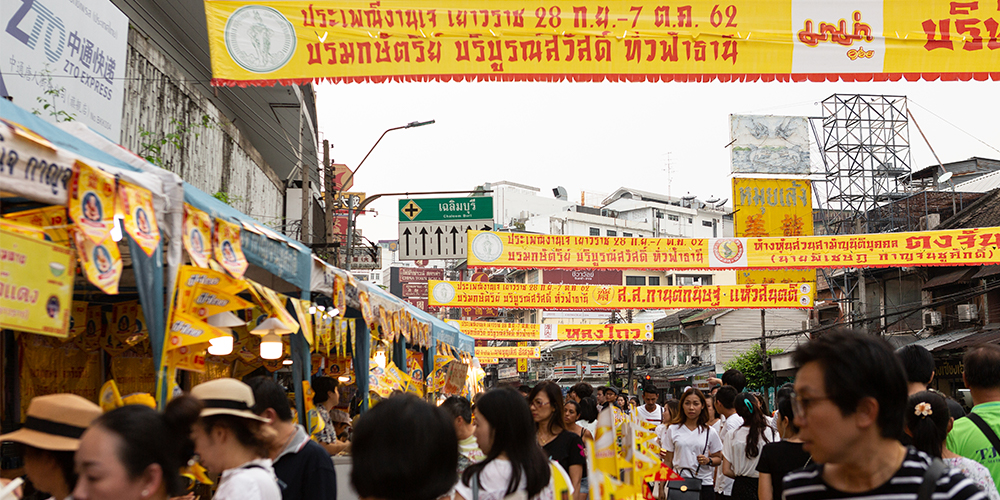
The end of September holds significant meaning for the Thai-Chinese community, as it marks the beginning of the Nine Emperor Gods Festival, more commonly known as Kin Je. During the nine-day period, Thais of Chinese descent or those who practice Buddhism refrain from eating meat and animal products and participate in prayers and meditation to purify the body and mind, all in honour of the Nine Emperor Gods of Chinese mythology. Although Kin Je Festival’s popularity has declined in China, many countries with big Chinese communities still participate, including Thailand, Malaysia, Singapore and Hong Kong.
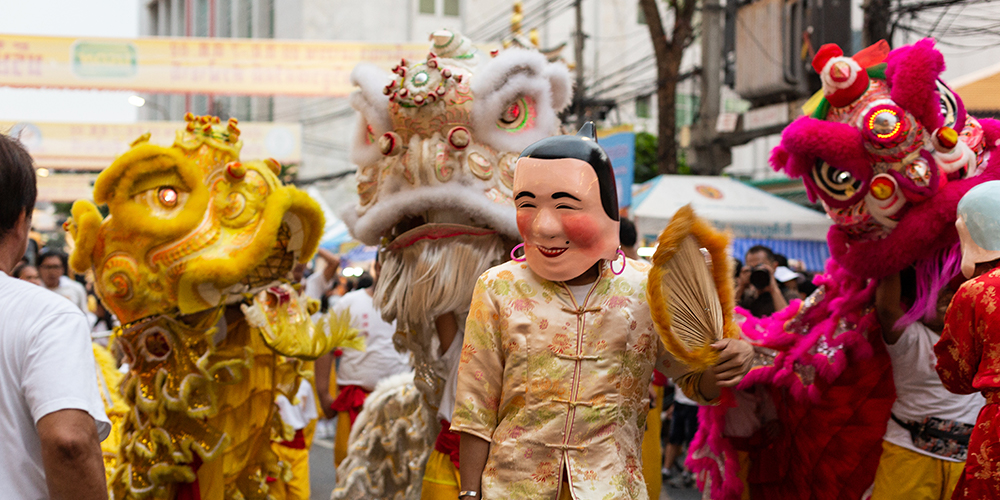
The date of the Kin Je Festival changes a little each year, but it usually falls on the ninth lunar month according to the Chinese calendar, and the festival lasts for nine days. In 2019 it starts on the evening of 28 September and lasts until 7 October.
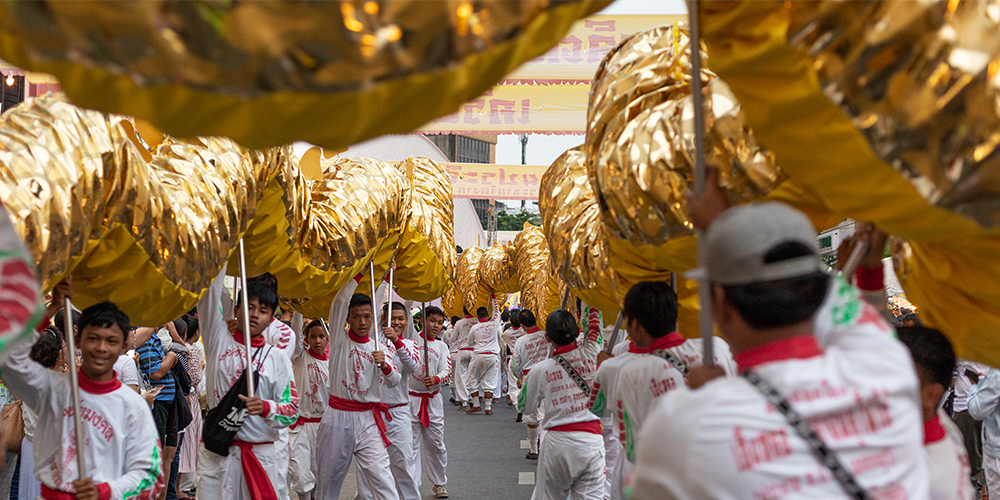
People participate in the festival for different reasons, but the most popular one is to honour the Nine Emperor Gods, who embody the nine stars in our constellation. According to the story, nine gods descend to Earth every day during this period, and participating in the Je diet is the way to celebrate their visit. Many Thai-Chinese also take this opportunity to honour Guanyin, the Chinese god of mercy, by not eating living things. Some people choose to get involved not for religious reasons, but rather as a chance to cleanse the body and detox from the meat-heavy Thai and Chinese cuisine.
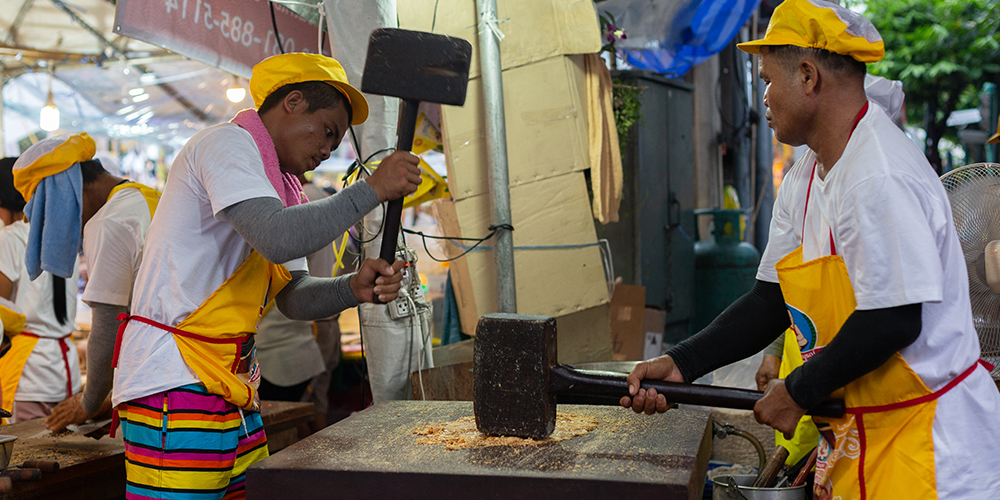
While the Je diet is similar to the vegan diet in that it forbids eating animal products or by-products, it goes further and also precludes certain herbs and spices. These are divided into five categories, which the Chinese believe to be the cause of certain diseases. For example, garlic is believed to be bad for the heart, onions are believed to be bad for the kidneys and chives are believed to be bad for the liver. Foods that have extreme spicy or sour flavours are also off the table during this time as the purpose of participating in the festival is to re-balance and cleanse the body. Participants should also be mindful about condiments used in cooking, like fish sauce, which is not considered to be Je. Extreme Je devotees are even said to only eat food from utensils that have never touched meat and cooked only by fellow festival devotees. Also, alcohol is forbidden, but coffee and tea are OK as long as you skip the milk.
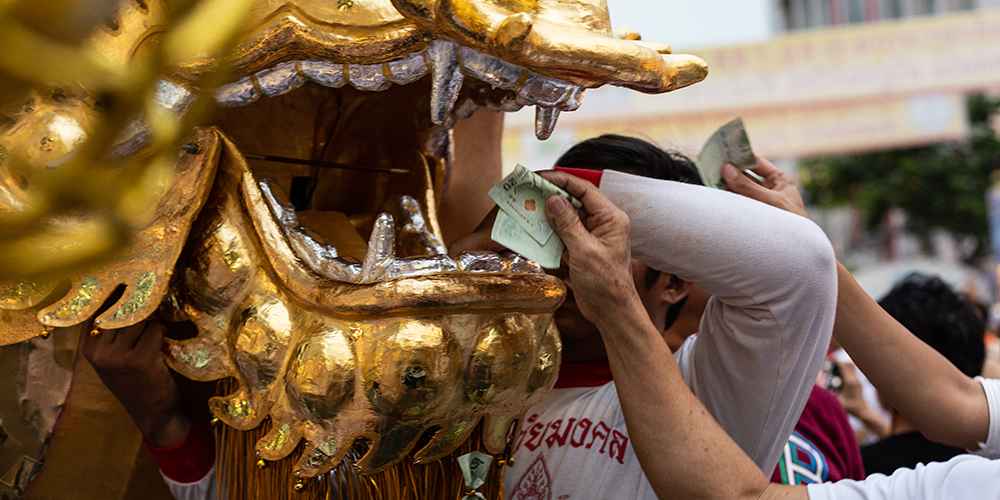
Besides avoiding animal products and alcohol, participants try to keep the body and mind clean during Kin Je Festival. That means no smoking and, in some extreme cases, some devotees even refrain from sex. Lots of people focus on balancing their minds with stress management techniques such as meditation, prayers and positive thinking. Some people dress in white or yellow to observe the festival.
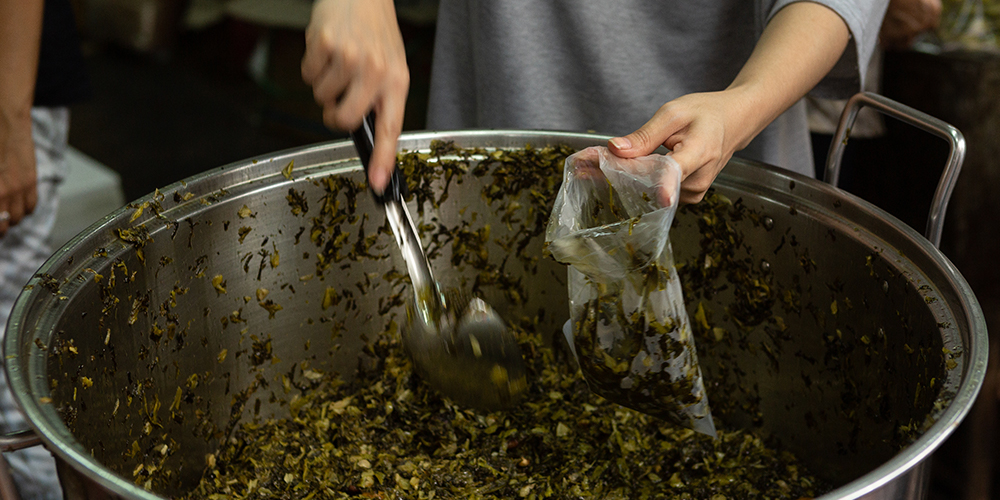
Even though Je, vegan and vegetarian diets share the same basic principle of not eating meat, there are a few clear distinctions between all of them. Vegetarians eat products that come from animals, like milk, eggs and cheese, while vegans keep their diets free of all animal products. Je is distinct from both in that it’s based on beliefs related to Chinese medicine and forbids certain herbs and spices as well.
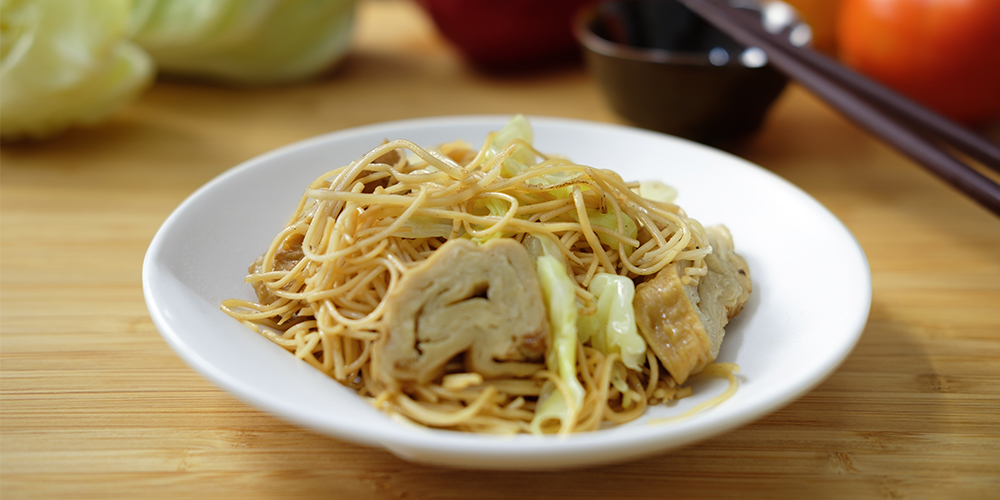
“Pad Mee Sua” (Chinese Stir Fried Noodles)
During the festival, you will find participating stalls and restaurants decorated with yellow flags with red writing. There are many delicious dishes to try during Kin Je Festival but here are some of the most popular:
“Tao Hu Tord” (Fried Tofu), “Phuak Tord” (Fried Taro), “Khaopod Tord” (Fried Corn Fritters)
These tasty appetisers are everywhere during Kin Je Festival. The firm tofu and vegetables will be deep-fried in hot oil until crispy on the outside and served with sweet and sour chilli sauce.
“Jub Chai” (Chinese Mixed Vegetables Soup)
This mildly sweet and slightly bitter soup usually comes with pork, but during Kin Je you’ll find it made with vegetables or sometimes tofu instead. Not only is the soup deliciously comforting, but it’s also packed with vitamins from different kinds of greens and mushrooms.
“Larb Je” (Spicy Imitation Meat Salad)
Larb is already a national favourite thanks to its fresh flavour. Some vendors use soy meat in the larb during this time. If you want an even lighter version, try mushroom larb. You might never want to go back to the meat version ever again.
“Rad Naa Je” (Noodles in Gravy Sauce)
Rad Naa Je is commonly found during Kin Je Festival, as the dish is already quite popular amongst Thai-Chinese community. This thick, gravy-like soup is comforting while the various types of vegetables are packed with much needed nutrients.
“Pad Mee Sua” (Chinese Stir Fried Noodles)
This festive dish appears in many Chinese celebrations as it is believed that it offers the secret to a long life, symbolised by the long, long noodles. If you’re looking for a delicious, single-dish wonder during Kin Je Festival, this is the one. Many vendors will use a mixture of cabbage, carrot and mushroom to make it extra scrumptious.
Beside the dishes recommended here, you will be happy to hear that lots of Thai desserts, including everyone’s fave mango sticky rice and lod chong are also Je-friendly. Just be extra careful about any desserts that contain animal by-products like milk, egg or butter and you should be able to enjoy Kin Je Festival like a local.
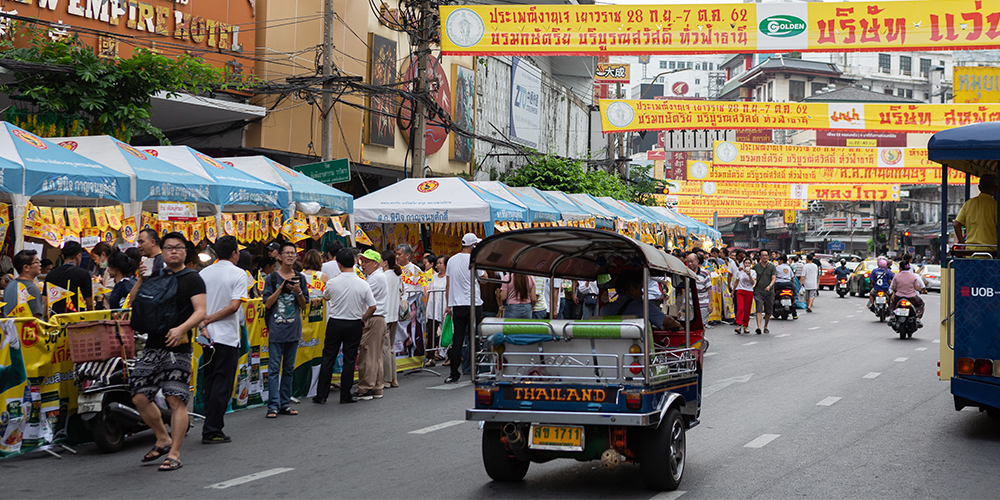
If you truly want to immerse yourself in the festivities of Je Festival, head down to Phuket for the experience of a lifetime. Besides street celebrations and all the delicious Je food you can eat, there is a special parade called “Ew-geng” and rituals performed by a group of extreme devotees called “Ma Song”, who were chosen as mediators for the gods. During the ritual, Ma Songs will use traditional weapons to pierce themselves, as it is believed that when the gods have embodied them, they will not feel any pain. Even though the Chinese-Thai community participates in this tradition, you won’t find any extreme body manipulation at Je Festivals in China. In fact, it is believed that this tradition has been adopted from Hinduism, most specifically the Thaipusam Festival that is celebrated by Tamil and Malay people all over the world. The act of self-inflicting pain is a symbol of sacrifice for the Ma Song, who believe that they are also carrying the pain of others who participate in the festival. Some Ma Song also believe that by enduring this temporary pain, they will be blessed with longer life.
For a less gruesome take on the event in Bangkok, head down to the neighbourhood of soon-to-open ASAI Chinatown. There’ll be more than 100 vendors along Yaowarat Road and the areas nearby and it’s your chance to experience Je Festival from a local perspective at these top spots:
Wat Mangkon Kamalawat
One of the most popular spots as a place of worship for many Thai-Chinese families, Wat Mangkon Kamalawat is busy all year round but especially during Kin Je Festival, as they hold special prayer sessions during this time.
Wat Bamphen Chin Phrot
Find this temple hidden in the back street of Soi Yaowarat 8. This temple was built in 1795, making it even older than the famous Wat Mangkon Kamalawat. During Kin Je Festival, it’s decorated in yellow lanterns that brighten up the traditional Chinese architecture.
Tai Hong Kong Shrine
Tai Hong Kong Shrine is home to the Poh Teck Tung Foundation, a charitable foundation that’s very famous in amongst the Thai-Chinese community in Bangkok. Locals come here all year round, but it’s especially busy during Kin Je Festival, as people gather here to make merit by buying coffins and muslins for the deceased without families.
Chao Zhou Shi Kong Shrine
This Chinese shrine located a stone’s throw from Chinatown is famous for serving one of the most delicious Je feasts in Bangkok. Besides coming here to make merit and taste Je food, you’ll be treated to Chinese opera too.
Chee Chin Khor Temple
If you’ve been on the Chao Phraya River Boat, you may have spotted a mysterious Chinese pagoda across the river: Chee Chin Khor Temple. This Chinese temple and non-profit foundation is famous for their Kin Je Festival with free Je cuisine for everyone in the community.
Whether you’re into the meat-free lifestyle or not, Kin Je Festival will give you an insight into Thai-Chinese traditions, and a chance to explore the city in a more earth-friendly and less stressful way. Happy vegging out.
